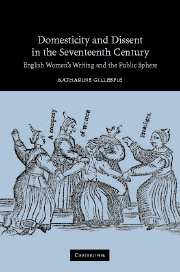Book contents
- Frontmatter
- Contents
- Acknowledgments
- Introduction: Sabrina versus the state
- 1 “Born of the mother's seed”: liberalism, feminism, and religious separatism
- 2 A hammer in her hand: Katherine Chidley and Anna Trapnel separate church from state
- 3 Cure for a diseased head: divorce and contract in the prophecies of Elizabeth Poole
- 4 The unquenchable smoking flax: Sarah Wight, Anne Wentworth, and the “rise” of the sovereign individual
- 5 Improving God's estate: pastoral servitude and the free market in the writings of Mary Cary
- Conclusion
- Index
1 - “Born of the mother's seed”: liberalism, feminism, and religious separatism
Published online by Cambridge University Press: 22 September 2009
- Frontmatter
- Contents
- Acknowledgments
- Introduction: Sabrina versus the state
- 1 “Born of the mother's seed”: liberalism, feminism, and religious separatism
- 2 A hammer in her hand: Katherine Chidley and Anna Trapnel separate church from state
- 3 Cure for a diseased head: divorce and contract in the prophecies of Elizabeth Poole
- 4 The unquenchable smoking flax: Sarah Wight, Anne Wentworth, and the “rise” of the sovereign individual
- 5 Improving God's estate: pastoral servitude and the free market in the writings of Mary Cary
- Conclusion
- Index
Summary
But O my Virgin Lady, where is she?
How chance she is not in your company?
Attendant Spirit, ComusIt is perhaps an understatement to say that liberalism and contract theory have become anathematic terms within postmodern academic feminism. As Carole Pateman most famously argues, because “republican” critiques by Locke (as well as Hobbes and Rousseau) liberated men from kingly rule in the political sphere by situating them as rulers over the domestic realm, then liberal political theory in general represents a “masculinist” tradition that contains little of value – and much of harm – for modern women. Although writings by such seventeenth-century sectarian women as Katherine Chidley, Anna Trapnel, Elizabeth Poole, Sarah Wight, Anne Wentworth, and Mary Cary are but “dews and drops” in a much larger river of political thought, I will argue that they nonetheless represent an alternative source of liberal ideas that have the potential to complicate this powerful and still highly influential thesis.
As Rachel Weil puts it, Pateman's 1987 study, The Sexual Contract: Aspects of Patriarchal Liberalism, “provides a starting point for the anti-liberal feminist cause” by grounding its antipathy within what she sees as its genealogical origin in contract theory's critique of patriarchalism. As it was reinvigorated in seventeenth-century England into a fully-fledged justification for divine right absolutism, patriarchal political theory was predicated upon the authority of the father.
- Type
- Chapter
- Information
- Domesticity and Dissent in the Seventeenth CenturyEnglish Women Writers and the Public Sphere, pp. 25 - 61Publisher: Cambridge University PressPrint publication year: 2004
- 1
- Cited by



